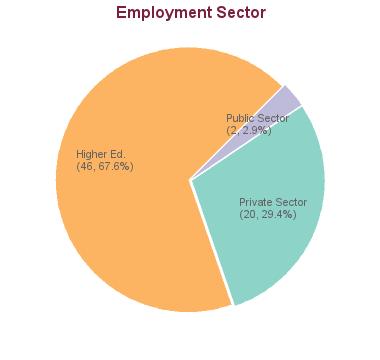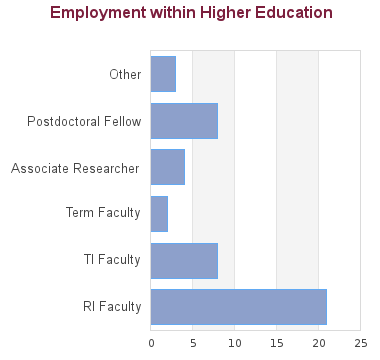Canadian Immigration Updates
Review details about the recently announced changes to study and work permits that apply to master’s and doctoral degree students. Read more
Overview
Mathematicians use theoretical and computational methods to solve a wide range of problems from the most abstract to the very applied. UBC's mathematics graduate students work in many branches of pure and applied mathematics. The PhD program trains students to operate as research mathematicians. The focus of the program is on substantial mathematical research leading to the PhD dissertation. Students also develop their skills in presenting and teaching mathematics and its applications.
What makes the program unique?
UBC has one of the largest and most vigorous departments of mathematics in Canada. Our faculty routinely win national and international awards for their research and teaching achievements. We have an engaged and sociable cohort of graduate students who are essential members of a broad selection of active research groups. Each group holds a variety of seminars and events that allow graduate students, postdoctoral fellows, visitors and faculty to enjoy regular interaction.
UBC is the headquarters for the Pacific Institute of Mathematical Sciences (PIMS). PIMS hosts a plethora of mathematical events such as conferences and summer schools, greatly enriching the scientific environment in the quantitative sciences at UBC. Our mathematics students are also regular participants at the nearby Banff International Research Station for Mathematical Innovation and Discovery. Finally, our Institute for Applied Mathematics provides options for interdisciplinary studies for PhD students who wish to work in applied and computational mathematics.
Quick Facts
Program Enquiries
Contact the program
Admission Information & Requirements
1) Check Eligibility
Minimum Academic Requirements
The Faculty of Graduate and Postdoctoral Studies establishes the minimum admission requirements common to all applicants, usually a minimum overall average in the B+ range (76% at UBC). The graduate program that you are applying to may have additional requirements. Please review the specific requirements for applicants with credentials from institutions in:
Each program may set higher academic minimum requirements. Please review the program website carefully to understand the program requirements. Meeting the minimum requirements does not guarantee admission as it is a competitive process.
English Language Test
Applicants from a university outside Canada in which English is not the primary language of instruction must provide results of an English language proficiency examination as part of their application. Tests must have been taken within the last 24 months at the time of submission of your application.
Minimum requirements for the two most common English language proficiency tests to apply to this program are listed below:
TOEFL: Test of English as a Foreign Language - internet-based
Overall score requirement: 100
Reading
22
Writing
21
Speaking
21
Listening
22
IELTS: International English Language Testing System
Overall score requirement: 7.0
Reading
6.5
Writing
6.5
Speaking
6.5
Listening
6.5
Other Test Scores
Some programs require additional test scores such as the Graduate Record Examination (GRE) or the Graduate Management Test (GMAT). The requirements for this program are:
The GRE is not required.
2) Meet Deadlines
3) Prepare Application
Transcripts
All applicants have to submit transcripts from all past post-secondary study. Document submission requirements depend on whether your institution of study is within Canada or outside of Canada.
Letters of Reference
A minimum of two references are required for application to graduate programs at UBC. Each graduate program determines the type of reference (e.g. academic, professional) and number of references they require which can range from 2 to 4. References should be requested from individuals who are prepared to provide a report on your qualifications for the program.
Statement of Interest
Many programs require a statement of interest, sometimes called a "statement of intent", "description of research interests" or something similar.
Supervision
Students in research-based programs usually require a faculty member to function as their thesis supervisor. Please follow the instructions provided by each program whether applicants should contact faculty members.
Instructions regarding thesis supervisor contact for Doctor of Philosophy in Mathematics (PhD)
Citizenship Verification
Permanent Residents of Canada must provide a clear photocopy of both sides of the Permanent Resident card.
4) Apply Online
All applicants must complete an online application form and pay the application fee to be considered for admission to UBC.
Tuition & Financial Support
Tuition
| Fees | Canadian Citizen / Permanent Resident / Refugee / Diplomat | International |
|---|---|---|
| Application Fee | $116.25 | $168.25 |
| Tuition * | ||
| Installments per year | 3 | 3 |
| Tuition per installment | $1,875.34 | $3,294.66 |
| Tuition per year (plus annual increase, usually 2%-5%) | $5,626.02 | $9,883.98 |
| Int. Tuition Award (ITA) per year (if eligible) | $3,200.00 (-) | |
| Other Fees and Costs | ||
| Student Fees (yearly) | $1,144.10 (approx.) | |
| Costs of living | Estimate your costs of living with our interactive tool in order to start developing a financial plan for your graduate studies. | |
All fees for the year are subject to adjustment and UBC reserves the right to change any fees without notice at any time, including tuition and student fees. Tuition fees are reviewed annually by the UBC Board of Governors. In recent years, tuition increases have been 2% for continuing domestic students and between 2% and 5% for continuing international students. New students may see higher increases in tuition. Admitted students who defer their admission are subject to the potentially higher tuition fees for incoming students effective at the later program start date. In case of a discrepancy between this webpage and the UBC Calendar, the UBC Calendar entry will be held to be correct.
Financial Support
Applicants to UBC have access to a variety of funding options, including merit-based (i.e. based on your academic performance) and need-based (i.e. based on your financial situation) opportunities.
Program Funding Packages
All full-time students who begin a UBC-Vancouver PhD Mathematics program in September 2018 or later will be provided with a funding package of at least $24,256 for each of the first four years of their PhD. The funding package may consist of any combination of internal or external awards, teaching-related work, research assistantships, and graduate academic assistantships.
Funding Statistics
This results in a net balance (any funding provided to the student minus tuition and fees) mean of $34,630 and median of $32,937.
- 51 students received Teaching Assistantships. Median TA funding based on 51 students was $15,943.
- 49 students received Research Assistantships. Median RA funding based on 49 students was $13,045.
- 3 students received Academic Assistantships. Median AA funding based on 3 students was $543.
- 52 students received internal awards. Median internal award funding based on 52 students was $7,799.
- 5 students received external awards. Median external award funding based on 5 students was $35,000.
Review methodology
Scholarships & awards (merit-based funding)
All applicants are encouraged to review the awards listing to identify potential opportunities to fund their graduate education. The database lists merit-based scholarships and awards and allows for filtering by various criteria, such as domestic vs. international or degree level.
Graduate Research Assistantships (GRA)
Many professors are able to provide Research Assistantships (GRA) from their research grants to support full-time graduate students studying under their supervision. The duties constitute part of the student's graduate degree requirements. A Graduate Research Assistantship is considered a form of fellowship for a period of graduate study and is therefore not covered by a collective agreement. Stipends vary widely, and are dependent on the field of study and the type of research grant from which the assistantship is being funded.
Graduate Teaching Assistantships (GTA)
Graduate programs may have Teaching Assistantships available for registered full-time graduate students. Full teaching assistantships involve 12 hours work per week in preparation, lecturing, or laboratory instruction although many graduate programs offer partial TA appointments at less than 12 hours per week. Teaching assistantship rates are set by collective bargaining between the University and the Teaching Assistants' Union.
Graduate Academic Assistantships (GAA)
Academic Assistantships are employment opportunities to perform work that is relevant to the university or to an individual faculty member, but not to support the student’s graduate research and thesis. Wages are considered regular earnings and when paid monthly, include vacation pay.
Financial aid (need-based funding)
Canadian and US applicants may qualify for governmental loans to finance their studies. Please review eligibility and types of loans.
All students may be able to access private sector or bank loans.
Foreign government scholarships
Many foreign governments provide support to their citizens in pursuing education abroad. International applicants should check the various governmental resources in their home country, such as the Department of Education, for available scholarships.
Working while studying
The possibility to pursue work to supplement income may depend on the demands the program has on students. It should be carefully weighed if work leads to prolonged program durations or whether work placements can be meaningfully embedded into a program.
International students enrolled as full-time students with a valid study permit can work on campus for unlimited hours and work off-campus for no more than 24 hours a week during academic sessions.
A good starting point to explore student jobs is the UBC Work Learn program or a Co-Op placement.
Tax credits and RRSP withdrawals
Students with taxable income in Canada may be able to claim federal or provincial tax credits.
Canadian residents with RRSP accounts may be able to use the Lifelong Learning Plan (LLP) which allows students to withdraw amounts from their registered retirement savings plan (RRSPs) to finance full-time training or education for themselves or their partner.
Please review Filing taxes in Canada on the student services website for more information.
Cost Estimator
Applicants have access to the cost estimator to develop a financial plan that takes into account various income sources and expenses.
Career Outcomes
88 students graduated between 2005 and 2013: 1 is in a non-salaried situation; for 19 we have no data (based on research conducted between Feb-May 2016). For the remaining 68 graduates:


RI (Research-Intensive) Faculty: typically tenure-track faculty positions (equivalent of the North American Assistant Professor, Associate Professor, and Professor positions) in PhD-granting institutions
TI (Teaching-Intensive) Faculty: typically full-time faculty positions in colleges or in institutions not granting PhDs, and teaching faculty at PhD-granting institutions
Term Faculty: faculty in term appointments (e.g. sessional lecturers, visiting assistant professors, etc.)
Sample Employers in Higher Education
University of Oregon (3)University of British Columbia (2)
University of Notre Dame (2)
University of Michigan - Ann Arbor (2)
University of Manitoba (2)
University of Kansas (2)
Harvard University (2)
Swiss Federal Institute of Technology (2)
Autonomous University of Yucatan
King Fahd University of Petroleum and Minerals
Sample Employers Outside Higher Education
Google (3)Sanoma B.V.
Centre for Human Drug Research
Futurice GmbH
Contact Energy Ltd.
Canada Pension Plan Investment Board (CPPIB)
Contextual Genomics
MDA Corp.
Amazon
Sample Job Titles Outside Higher Education
Data Scientist (3)Software Engineer (2)
Actuarial Analyst
Lead Software Creator
Quantitative Analyst
Senior Analyst
Applied Research Mathematician
Education Specialist
Programmer
Senior Software Engineer
PhD Career Outcome Survey
You may view the full report on career outcomes of UBC PhD graduates on outcomes.grad.ubc.ca.Disclaimer
These data represent historical employment information and do not guarantee future employment prospects for graduates of this program. They are for informational purposes only. Data were collected through either alumni surveys or internet research.Enrolment, Duration & Other Stats
These statistics show data for the Doctor of Philosophy in Mathematics (PhD). Data are separated for each degree program combination. You may view data for other degree options in the respective program profile.
ENROLMENT DATA
| 2023 | 2022 | 2021 | 2020 | 2019 | |
|---|---|---|---|---|---|
| Applications | 155 | 167 | 176 | 176 | 114 |
| Offers | 30 | 21 | 27 | 29 | 22 |
| New Enrolment | 12 | 11 | 17 | 13 | 17 |
| Total Enrolment | 72 | 68 | 64 | 65 | 72 |
Completion Rates & Times
Disclaimer
Research Supervisors
Supervision
Students in research-based programs usually require a faculty member to function as their thesis supervisor. Please follow the instructions provided by each program whether applicants should contact faculty members.
Instructions regarding thesis supervisor contact for Doctor of Philosophy in Mathematics (PhD)
Advice and insights from UBC Faculty on reaching out to supervisors
These videos contain some general advice from faculty across UBC on finding and reaching out to a supervisor. They are not program specific.
Doctoral Citations
| Year | Citation |
|---|---|
| 2016 | Dr. Bai completed his doctoral work in the application of mathematics and game theory. He studied how to use mathematical models to predict the expected level of vaccine coverage. His research will help inform possible strategies in public health to fight against infectious diseases. |
| 2016 | Dr. Lim studied the mathematical behavior of financial options that depend on multiple underlying stocks, and how the prices for the underlying stocks can move in such a manner to optimize the price of the option. He showed that such optimal movements exhibit a certain natural extremal structure which is visible in higher dimensional spaces. |
| 2016 | The research of Dr. Karslidis was in the field of Harmonic Analysis. He worked on a functional inequality, called the small ball inequality, which has numerous applications in probability and approximation theory. He proved the optimal version of this inequality under mild hypotheses. |
| 2016 | Dr. Gou formulated and investigated a class of mathematical models that describe the coupling of spatially segregated, dynamically active units through a signaling molecule that diffuses in the bulk medium between active units. These studies assist us in understanding the pattern formation phenomena observed in many biological systems. |
| 2015 | Dr. Lindstrom worked on predicting the operation of a magnetized target fusion reactor, a design for clean energy that crushes a plasma in an imploding shell of molten metal. By writing a program to simulate the system, and a careful series of pencil-and-paper estimates, he inferred key features of the device and ways to improve its efficiency. |
| 2015 | Dr. Hambrook studied the Fourier transform, which is the mathematical operation that decomposes a signal into its component frequencies. The Fourier transform is a fundamental tool in science, engineering, and technology. Dr. Hambrook's work has provided powerful insights into the deep geometric and arithmetic structure of this important operation. |
| 2015 | Looking at even the most ordinary objects at the tiniest of scales, we see particles that behave in strange, un-intuitive ways, according to quantum mechanics. Similarly, if matter cools to very low temperatures, its behaviour may become strange and quantum. Dr. Blois derived rigorous formulas aimed to describe this low-temperature quantum behaviour |
| 2015 | Dr. Tomberg's research in probability and statistical mechanics focused on applying a rigorous renormalisation group method to compute critical correlation functions. This research contributes to our understanding of statistical properties of interacting systems in the vicinity of a critical point. |
| 2015 | Can combinatorial models be used to study linear polymers? Dr. Wong used mathematical models to predict the physical behaviour of linear polymers confined in a slit, concluding that the results realistically mimic experimental findings. The methods in this project can be used to study a variety of other problems both within and outside mathematics. |
| 2015 | Dr. Stykow completed his doctoral research in the field of mathematics. He studied the nature of topological spaces and computed important invariants that help distinguish them from one another. |
Pages
Sample Thesis Submissions
Further Information
Specialization
Mathematicians use theoretical and computational methods to solve a wide range of problems from the most abstract to the very applied. UBC's mathematics graduate students work in many branches of pure and applied mathematics.
Program Website
Faculty Overview
Academic Unit
Program Identifier
Classification
Program Enquiries
Contact the program
Departments/Programs may update graduate degree program details through the Faculty & Staff portal. To update contact details for application inquiries, please use this form.

Curious about life in Vancouver?
Find out how Vancouver enhances your graduate student experience—from the beautiful mountains and city landscapes, to the arts and culture scene, we have it all. Study-life balance at its best!




